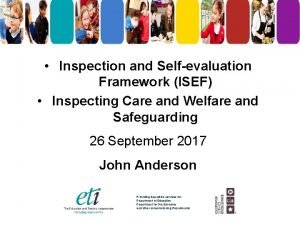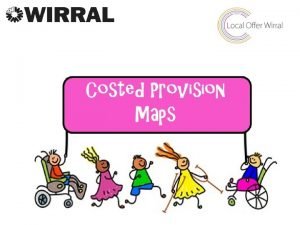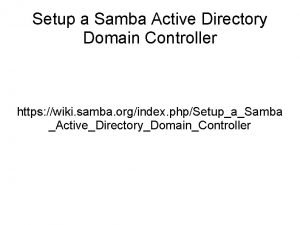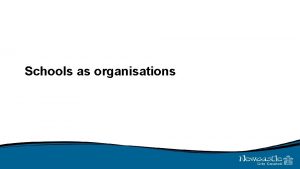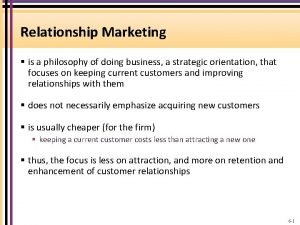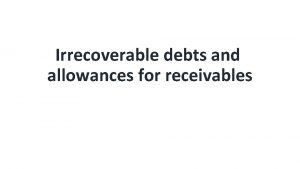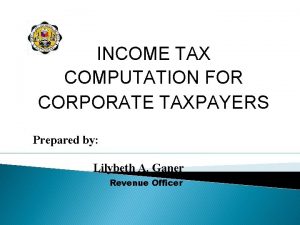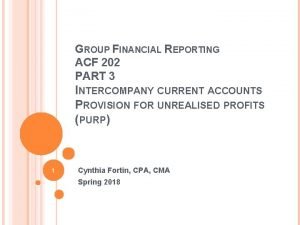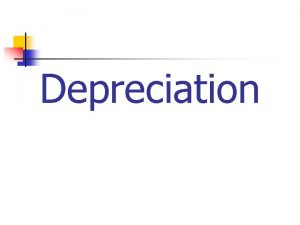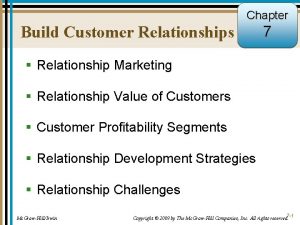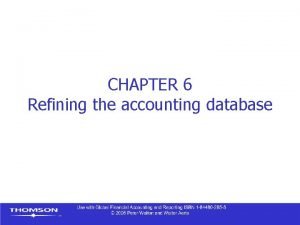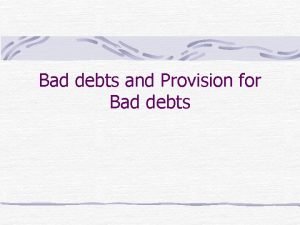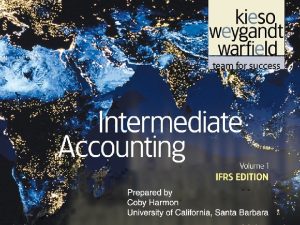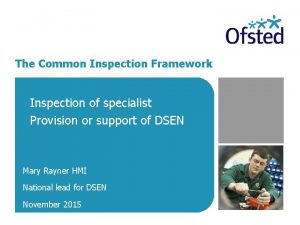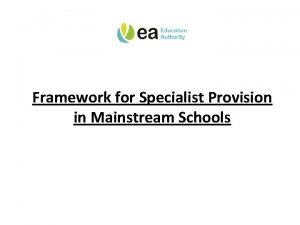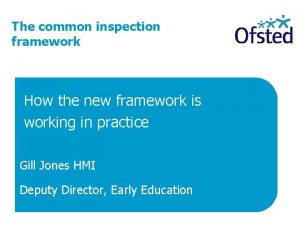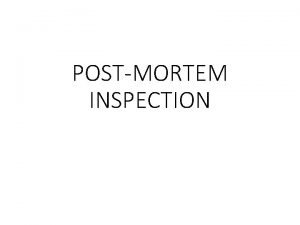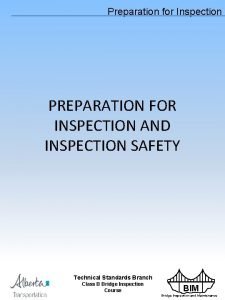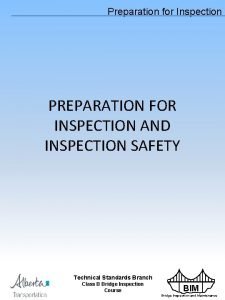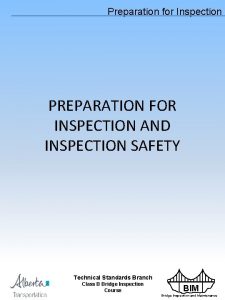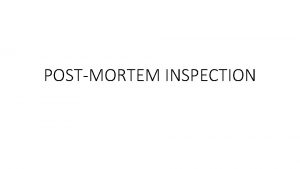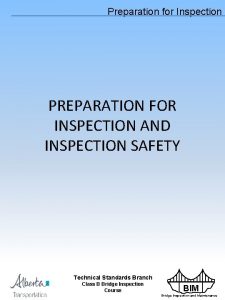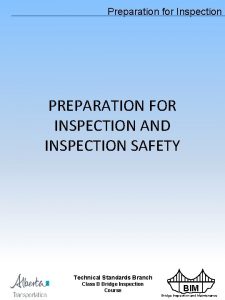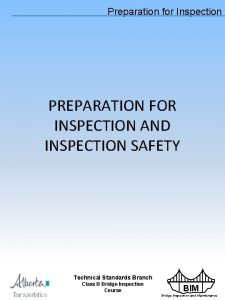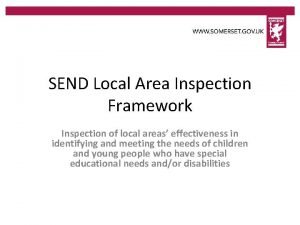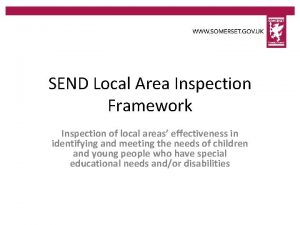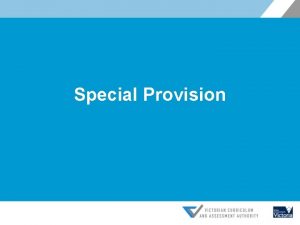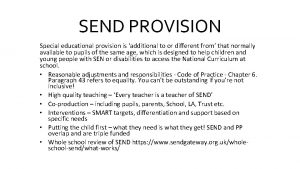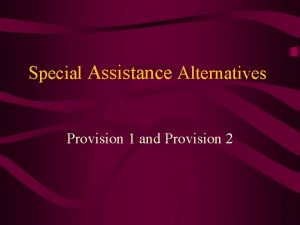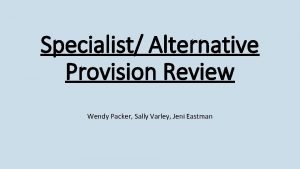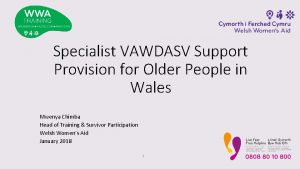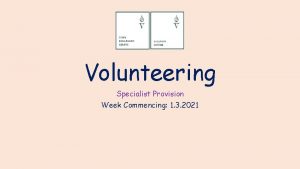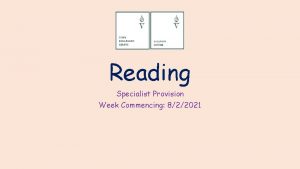The Common Inspection Framework Inspection of specialist Provision























- Slides: 23

The Common Inspection Framework Inspection of specialist Provision or support of DSEN Mary Rayner HMI National lead for DSEN November 2015

Inspectors should evaluate Inspection is primarily about evaluating how well individual pupils benefit from their school. It is important to test the school’s response to individual needs by observing how well it helps all pupils to make progress and fulfil their potential. 2

Understanding the changes Getting to good 3

A new Common Inspection Framework Inspectors will make four key judgements: § § Effectiveness of leadership and management Quality of teaching, learning and assessment Personal development, behaviour and welfare Outcomes for children and learners And will state clearly whether safeguarding is effective. Common Inspection Framework 4

A new Common Inspection Framework § The CIF will provide greater clarity, coherence and comparability for learners, parents and employers. § § Judgements will be comparable across all Ofsted reports for: early years provision 16 to 19 study programmes In FE and skills inspection, inspectors will report on types of provision – including apprenticeships, adult learning and learners with high needs Common inspection framework 5

Raising standards, improving lives Inspectors must take account of the learning and progress across year groups of different groups of pupils currently on the roll of the school, including disabled pupils, those who have special educational needs and those for whom the pupil premium provides support and the most able. 6

Section 5 inspections Ofsted does not expect evidence to be provided in a specific format or generated for inspection purposes. 7

Teaching, learning and assessment § § Ofsted does not grade individual lessons. § Ofsted does not require any specific frequency, type or volume of marking and feedback or written record of oral feedback provided to pupils by teachers. § Ofsted does not require a particular frequency or quantity of work in pupils’ books. § Ofsted does not expect performance information to be presented in a particular format. Ofsted does not require evidence for each teacher for each of the bulleted sub-headings of the Teachers’ Standards or specific details of the pay grade of individual teachers who are observed during inspection. 8

Assessment In evaluating the accuracy of assessment, inspectors will consider how well: § any baseline assessment, teacher assessment and testing are used to modify teaching so that pupils achieve the expected standards by the end of year or key stage § assessment draws on a range of evidence of what pupils know, understand can do in the different aspects of subjects in the curriculum § teachers make consistent judgements about pupils’ progress and attainment, for example within a subject, across a year group and between year groups.

assessment information Criteria n age and starting point n highlights individuals and groups n effectively moderated n objective & broad n challenging and informative n links to curriculum but does not define the curriculum n cross–referenced with other subject areas

Assessment without levels There is currently Df. E work being carried out: The commission looking at assessment without levels (https: //www. gov. uk/government/groups/commi ssion-on-assessment-without-levels) and a new group currently being set up to look at assessment for low attaining pupils that will be helpful to schools and inspectors (https: //www. gov. uk/government/news/specialneeds-expert-to-head-new-assessment-review).

Personal development and welfare Inspectors must make a clear written judgement about behaviour and a separate clear written judgement about personal development and welfare in the inspection report. Where the judgements differ the lower of the two will determine the overall judgement for personal development, behaviour and welfare in the inspection report. Inspectors must use all their evidence to evaluate what it is like to be a pupil in the school. Inspectors adopt a ‘best fit’ approach that relies on the professional judgement of the inspection team. 12

Outstanding personal development, behaviour and welfare § Pupils are prepared for the next stage of their education, employment, self-employment and training § Pupils value their education and rarely miss a day at school. No groups of pupils are disadvantaged by low attendance § For individuals or groups with particular needs, there is sustained improvement in pupils’ behaviour § Pupils are safe and feel safe at all times. They trust leaders to take rapid and appropriate action to resolve any concerns they have. 13

Outcomes for pupils Inspectors will take account of current standards and progress including the school’s own performance information. Inspectors will evaluate pupils’ academic and vocational achievement. In judging achievement inspectors will give most weight to pupils’ progress taking account of their starting points. Within this they will give most weight of pupils currently in the school, taking account of how this compares with recent cohorts, where relevant. Common inspection framework 14

Outcomes When judging the quality of pupils’ outcomes the following aspects are important: § preparation for the next stage(s) in education, training and employment, and adult life § identification of intended outcomes/targets involves the young person and parents/carers § having high expectations, using national comparator information where this is available § § age and starting point of the young person taking into account the young person’s disability/special educational needs

Assessment of outcomes § The proportions making expected progress and the proportions exceeding expected progress in English and in mathematics from each starting point, compared with national figures, for all pupils § § Use of any P level data § The contribution of IEP/EHCP targets Any analysis of robust progress information presented by the school, including information provided by external organisations

Leadership and management The evaluation schedule is not exhaustive. It does not replace the professional judgement of inspectors. It is up to schools themselves to determine their practices and for leadership teams to justify these on their own merit. 17

Outstanding leadership and management § Leaders and governors focus on consistently improving outcomes for all pupils, but especially for disadvantaged* pupils. They are uncompromising in their ambition § Governors systematically challenge senior leaders so that the effective deployment of staff and resources, including the pupil premium and SEN funding, secures excellent outcomes for pupils. Governors do not shy away from challenging leaders about variations in outcomes for pupil groups, especially between disadvantaged* and other pupils. 18

Making final judgements Inspectors make the key judgements in the following order: § § the quality of teaching, learning and assessment § § § the final judgement on the overall effectiveness evaluating: personal development, behaviour and welfare outcomes for pupils the effectiveness of leadership and management. Inspectors will always make a written judgement in the section on leadership and management about the effectiveness of the arrangements for safeguarding pupils. the effectiveness and impact of the provision SMSC the extent to which the education provided by the school meets the needs of the range of pupils at the school including: disabled pupils who have special educational needs. 19

Short inspections § Short inspections for good schools, academies and FE and skills providers – approximately every three years, for one day (schools) or up to two days (FE&S). § § Two judgements only: Is the school/provider still good? Is safeguarding effective? Greater professional dialogue during the inspection; more regular reporting to parents, learners and employers. 20

21

Key points to consider § § Labels are not relevant – needs are relevant § Expectations should be high: all pupils, all groups, all aspects, all the time § Pupils need to be challenged to push the boundaries (college, travel, walking round school) § § § Learning should be taking place throughout the day Developing independence is crucial no matter how severe the disability Age appropriateness and dignity are crucial Curriculum pathways should be planned according to suitable destinations. 22

Questions Mary Rayner HMI National leads for DSEN November 2015
 Public provision example
Public provision example Unit 4 common specialist technical principles
Unit 4 common specialist technical principles Isef eti
Isef eti What is catering
What is catering Costed provision map example
Costed provision map example Samba domain controller einrichten
Samba domain controller einrichten Summarise types of early years provision
Summarise types of early years provision Core service provision
Core service provision Servicios ecosistémicos de soporte
Servicios ecosistémicos de soporte Provision of unrealised profit
Provision of unrealised profit Qué acto aseguro nuestra salvación
Qué acto aseguro nuestra salvación Irrecoverable debts account
Irrecoverable debts account How to compute mcit
How to compute mcit Hire purchase in balance sheet
Hire purchase in balance sheet Intercompany margin
Intercompany margin Provision food list
Provision food list Motor vehicle depreciation
Motor vehicle depreciation Provision of depreciation account
Provision of depreciation account Building customer relationship in service marketing
Building customer relationship in service marketing Provision vs accrual
Provision vs accrual Provision for doubtful debts journal entry
Provision for doubtful debts journal entry Provision for receivables
Provision for receivables Provision vs accrual
Provision vs accrual Contingent liability examples
Contingent liability examples


